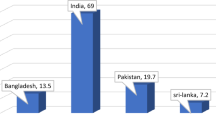Abstract
Immigration policies in most developed countries are increasingly tilted toward skilled labor. Whether such policies hurt the sending countries is somewhat controversial. In this paper, we emphasize one aspect of skilled migrants’ effect, namely whether income inequality increases with migrants’ level of education in sending countries. Using pooled Gini coefficient from 1980 to 2010 data for 110 developing countries, the analysis finds that an emigration of unskilled labor produces an unfavorable effect on the wage inequality. That is, inequality increases with an increase in unskilled labor emigration from the country. However, there appears to be no effect of skilled emigration on inequality. A clearer understanding of the channels through which low-skilled migration will be detrimental for income inequality in developing countries may assist policymakers to craft appropriate policies to curtail low-skilled migration that would serve to improve equality. To the extent that inequality depresses (promotes) economic development, then emigration of low-skilled workers could impede (facilitate) economic growth.
Similar content being viewed by others
Notes
Because of the unlimited supply of unskilled workers in developing countries, W rising may be unlikely with the emigration of such workers. See Lewis (1954).
References
Acemoglu, Daron, Suresh Naidu, Pascual Restrepo, and James A. Robinson. 2015. Democracy, Redistribution, and Inequality. In Handbook of Income Distribution, vol. 2, ed. Anthony B. Atkinson and François Bourguignon, 1885–1966. Amsterdam: Elsevier.
Albanesi, S. 2007. Inflation and Inequality. Journal of Monetary Economics 54 (4): 1088–1114.
Al-Marhubi, F. 1997. A Note on the Link Between Income Inequality and Inflation. Economy Letters 55 (3): 317–319.
Baltagi, B.H. 2008. Econometric Analysis of Panel Data, 4th ed. Chichester: Wiley.
Baum, F.C. 2006. An Introduction to Modern Econometrics Using Stata. Texas: Stata Press.
Bond, S. R. 2002. Dynamic panel data models: a guide to micro data methods and practice. Portuguese Economic Journal 1 (2): 141–162
Card, D. 2009. Immigration and inequality (No. w14683). Cambridge: NBER.
Edo, A., and F. Toubal. 2015. Selective Immigration Policies and Wages Inequality. Review of International Economics 23 (1): 160–187.
Feenstra, R.C., and G.H. Hanson. 1997. Foreign Direct Investment and Relative Wages: Evidence from Mexico's Maquiladoras. Journal of international economics 42 (3–4): 371–393.
Kuznets, Simon. 1963. Quantitative Aspects of the Economic Growth of Nations. VIII: The Distribution of Income by Size. Economic Development and Cultural Change 11: 1–80.
Kuznets, Simon. 1976. Growth, Population and Income Distribution: Selected Essays. New York: Norton.
Lewis, W.A. 1954. Economic Development with Unlimited Supplies of Labour. The Manchester School 22 (2): 139–191.
Marjit, S., and S. Kar. 2005. Emigration and Wage Inequality. Economics Letters 88 (1): 141–145.
Mountford, A., and H. Rapoport. 2011. The Brain Drain and the World Distribution of Income. Journal of Development Economics 95 (1): 4–17.
Mountford, A., and H. Rapoport. 2016. Migration Policy, African Population Growth and Global Inequality. The World Economy 39 (4): 543–556.
Partridge, M.D. 2006. The Relationship Between Inequality and Labor Market Performance: Evidence From US States. Journal of Labor Research 27 (1): 1–20.
Roodman, D. (2006) How to Do xtabond2: An Introduction to “Difference” and “System” GMM in Stata, Center for Global Development Working Paper No. 103.
Uprety, D. 2017. The Impact of International Trade on Emigration in Developing Countries. The Journal of International Trade & Economic Development 26 (8): 907–923.
Uprety, D., and K. Sylwester. 2017. The Effect of Remittances Upon Skilled Emigration: An Empirical Study. The Journal of Economic Development 42 (2): 1–15.
Windmeijer, F. 2005. A Finite Sample Correction for the Variance of Linear Efficient Two-Step GMM Estimators. Journal of Econometrics 126 (1): 25–51.
Xu, P., J.C. Garand, and L. Zhu. 2016. Imported Inequality? Immigration and Income Inequality in the American States. State Politics & Policy Quarterly 16 (2): 147–171.
Yabuuchi, S., and S. Chaudhuri. 2007. International Migration of Labor and Skilled–Unskilled Wage Inequality in a Developing Economy. Economic Modelling 24 (1): 128–137.
Author information
Authors and Affiliations
Corresponding author
Additional information
Publisher's Note
Springer Nature remains neutral with regard to jurisdictional claims in published maps and institutional affiliations.
Appendix
Appendix
See Table 6.
Rights and permissions
About this article
Cite this article
Uprety, D. How Do Factor Specificity and Emigration Make Income Inequality Worse in Developing Countries?. J. Quant. Econ. 18, 783–798 (2020). https://doi.org/10.1007/s40953-020-00201-3
Published:
Issue Date:
DOI: https://doi.org/10.1007/s40953-020-00201-3




